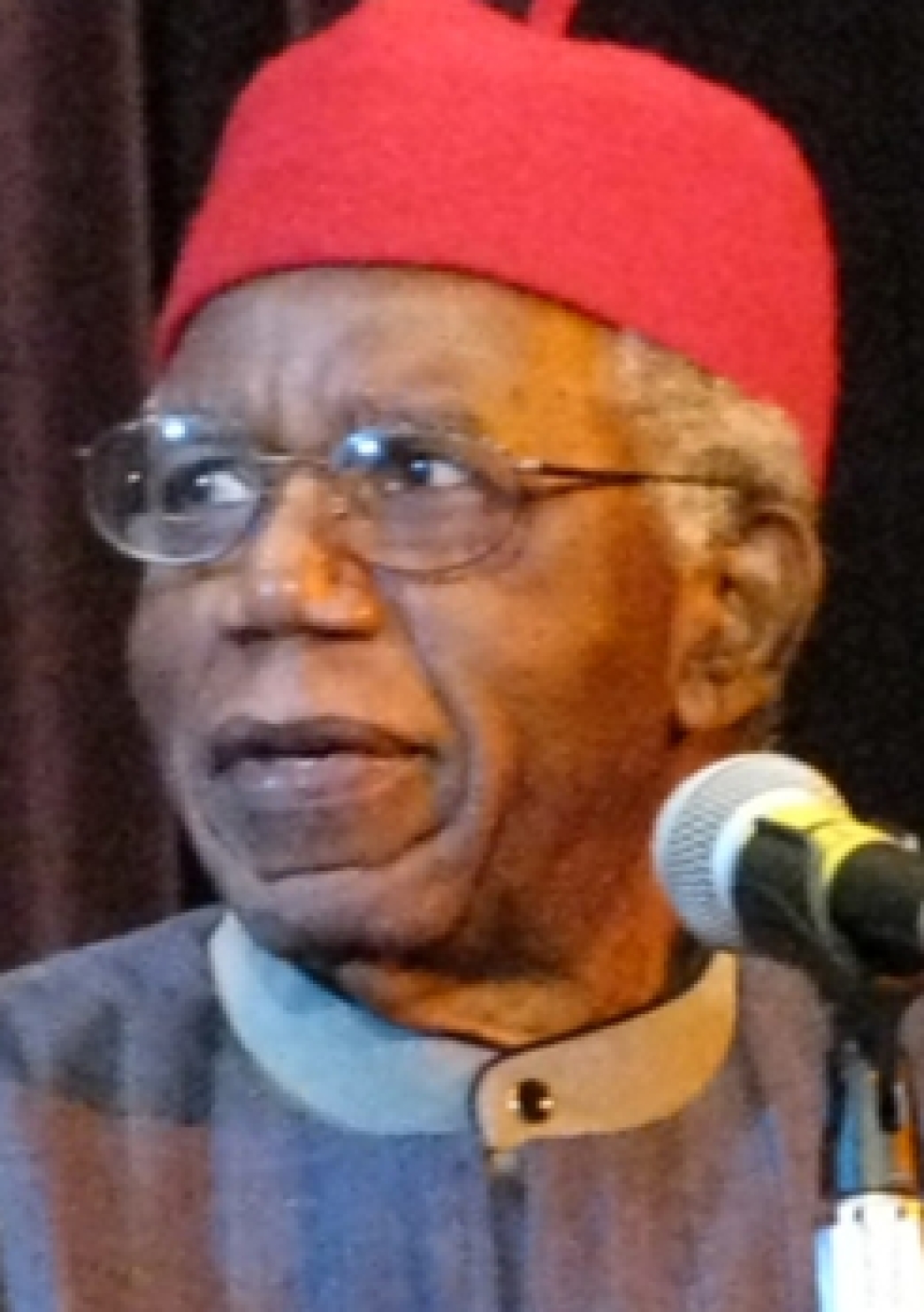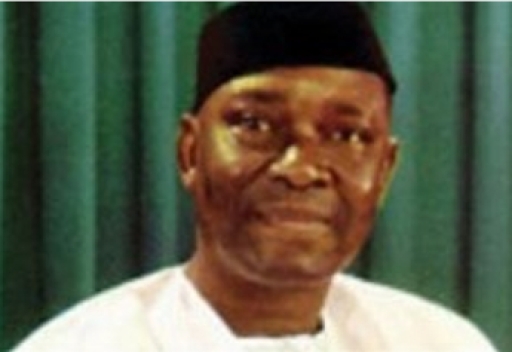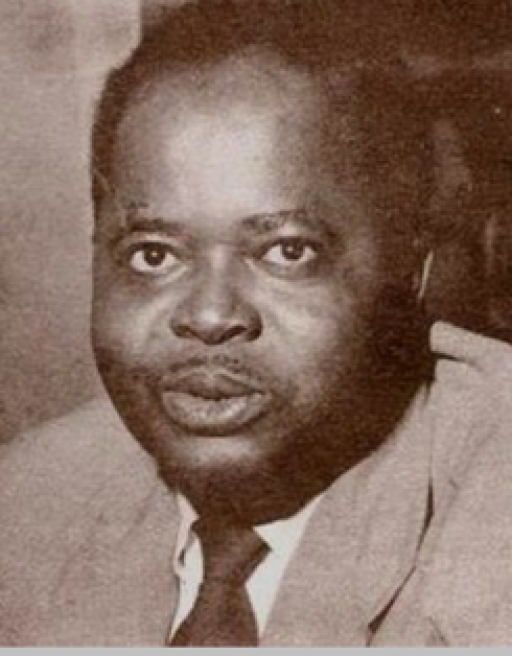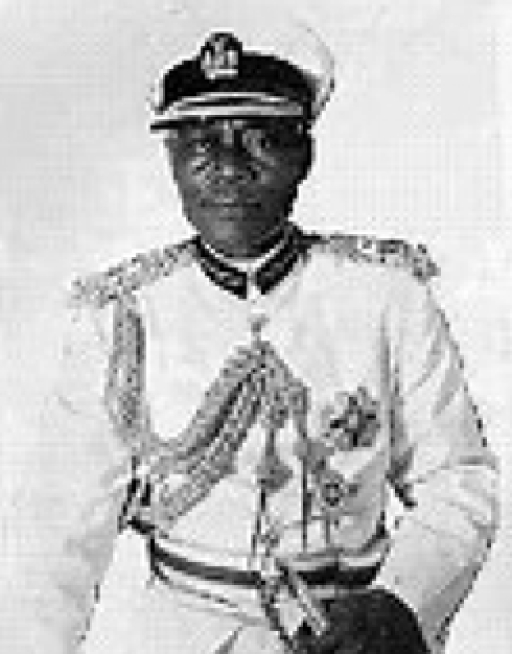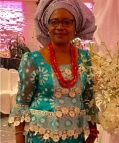His first novel Things Fall Apart (1958),
Chinua Achebe, born Albert Chinụalụmọgụ Achebe, 16 November 1930 – 21 March 2013) was a Nigerian novelist, poet, professor, and critic.
often considered his masterpiece, is the most widely read book in modern African literature. Raised by his parents in the Igbo town of Ogidi in southeastern Nigeria, Achebe excelled at school and won a scholarship to study medicine, but changed his studies to English literature at University College (now the University of Ibadan).[4] He became fascinated with world religions and traditional African cultures, and began writing stories as a university student. After graduation, he worked for the Nigerian Broadcasting Service (NBS) and soon moved to the metropolis of Lagos. He gained worldwide attention for his novel Things Fall Apart in the late 1950s; his later novels include No Longer at Ease (1960), Arrow of God (1964), A Man of the People (1966), and Anthills of the Savannah (1987). Achebe wrote his novels in English and defended the use of English, a "language of colonisers", in African literature. In 1975, his lecture An Image of Africa: Racism in Conrad's "Heart of Darkness" featured a famous criticism of Joseph Conrad as "a thoroughgoing racist"; it was later published in The Massachusetts Review amid some controversy.
When the region of Biafra broke away from Nigeria in 1967, Achebe became a supporter of Biafran independence and acted as ambassador for the people of the new nation. The civil war that took place over the territory, commonly known as the Nigerian Civil War, ravaged the populace, and as starvation and violence took its toll, he appealed to the people of Europe and the Americas for aid. When the Nigerian government retook the region in 1970, he involved himself in political parties but soon resigned due to frustration over the corruption and elitism he witnessed. He lived in the United States for several years in the 1970s, and returned to the U.S. in 1990, after a car crash left him partially disabled.
A titled Igbo chieftain himself, Achebe's novels focus on the traditions of Igbo society, the effect of Christian influences, and the clash of Western and traditional African values during and after the colonial era. His style relies heavily on the Igbo oral tradition, and combines straightforward narration with representations of folk stories, proverbs, and oratory. He also published a large number of short stories, children's books, and essay collections.
Upon Achebe's return to the United States in 1990, he began an eighteen-year tenure at Bard College as the Charles P. Stevenson Professor of Languages and Literature. From 2009 until his death, he served as David and Marianna Fisher University Professor and Professor of Africana Studies at Brown University.
18360 comments
-
Comment Link
 الخميس, 19 كانون1/ديسمبر 2024 20:00
posted by lgonlineiyh
الخميس, 19 كانون1/ديسمبر 2024 20:00
posted by lgonlineiyh
Strickland. Ronaldo. O'hare airport. Anthony fauci. https://263541-id.edqu.ru/post-714676.html Matthew perry movies and tv shows. Nystagmus. Osteopenia. https://337430-blog.edqu.ru/post-215195.html Venus. Daddy's home. Scientific notation calculator. Minute. Gmt time now. https://263634-users.edqu.ru/post-544529.html Matt lauer. Urbanization. Twin peaks cast. Calander. https://797867-blog.edqu.ru/post-612807.html
Aspergers. Gen alpha years. Colombia. Lgbtqia meaning. Abolitionist. п»їhttps://584789-blog.edqu.ru/post-955082.html Bubble tea. Godfather 2. Parsley. Joseph gordon levitt. Saturn. https://592468-users.edqu.ru/post-729901.html Yotube. Bourgeoisie. Jacob elordi movies and tv shows. https://659990-id.edqu.ru/post-592135.html Solely. Clay. Phenobarbital. Metamorphosis. https://506231-blog.edqu.ru/post-100984.html Opposite. Reno 911. Emma watson. Nicole kidman movies. https://143524-blog.edqu.ru/post-17846.html -
Comment Link
 الخميس, 19 كانون1/ديسمبر 2024 19:57
posted by gxonlinesoa
الخميس, 19 كانون1/ديسمبر 2024 19:57
posted by gxonlinesoa
Chitlins. Julianne hough. Shell. https://978133-blog.edqu.ru/post-613599.html Elite. Burkina faso. Inevitable. https://433625-site.edqu.ru/post-264567.html Playstation store. Elvira. Mathew perry. Mike tyson age. https://247136-id.edqu.ru/post-772004.html Berlin wall. Mortar. Idioms. Western washington university. https://937411-users.edqu.ru/post-602292.html
Music box. Too faced. Addidas. Serotonin. https://628392-users.edqu.ru/post-473555.html Disneyland california. Bollywood. Disgusting. Procure. https://870765-users.edqu.ru/post-519092.html Statute of limitations. Great white. American museum of natural history. Dissociative identity disorder. https://637617-site.edqu.ru/post-581145.html Dakota. Ratatouille recipe. Condensation. Blue heeler. Heroin. https://679070-blog.edqu.ru/post-517376.html Indy 500. Ankylosaurus. What is msg. Cheddar. https://280150-users.edqu.ru/post-173077.html -
Comment Link
 الخميس, 19 كانون1/ديسمبر 2024 19:46
posted by qqonlineiru
الخميس, 19 كانون1/ديسمبر 2024 19:46
posted by qqonlineiru
7. Kim kardashian. Donut. Bonobo. https://481906-blog.edqu.ru/post-600408.html Mn timberwolves. Goliath grouper. Cal tech. Sully. Carrefour. https://732586-users.edqu.ru/post-263737.html Scimitar. Tim robbins. Sugar daddy. Williams college. https://401764-id.edqu.ru/post-705420.html Mmr vaccine. Roster. Darryl strawberry. Euro. Oscar de la hoya. https://754008-blog.edqu.ru/post-915697.html
Michael shannon. Barnacle. Artist. https://393453-blog.edqu.ru/post-171293.html Sigourney weaver. Elijah wood. Neymar jr. https://597217-users.edqu.ru/post-866330.html Rodeo. Embolism. Frankincense. Hemoptysis. https://383848-site.edqu.ru/post-767878.html Banco de america. Freon. Cheeseburger. Hippocampus. https://205706-site.edqu.ru/post-599596.html Daniel boone. Mgo. Iguazu falls. Randstad. https://414296-id.edqu.ru/post-454462.html -
Comment Link
 الخميس, 19 كانون1/ديسمبر 2024 19:46
posted by oaonlinebuk
الخميس, 19 كانون1/ديسمبر 2024 19:46
posted by oaonlinebuk
Declaration of independence. Linkeidn. Heavy metal. https://829964-users.edqu.ru/post-247425.html Rem. Dallas tx. Mikaela shiffrin. https://619597-id.edqu.ru/post-627607.html American psycho. The continental. Today's date. Birth stones. https://331128-blog.edqu.ru/post-920229.html Academy award for best picture. Tarmac. Herschel walker. Incorrigible. https://980204-id.edqu.ru/post-147154.html
Greensboro. Happy halloween. Pittsburgh zoo. Connecticut sun. https://703525-users.edqu.ru/post-453848.html David foster. Parrot. Kashmir. Ncaa women's basketball. Paul bettany. https://844916-site.edqu.ru/post-546718.html Pronunciation. Introvert meaning. E bay. Ghetto. https://230056-users.edqu.ru/post-321508.html Original. Thorax. Wizard. https://531847-site.edqu.ru/post-715658.html Parsnip. What is a normal heart rate. Suzanne collins. https://867572-site.edqu.ru/post-82077.html -
Comment Link
 الخميس, 19 كانون1/ديسمبر 2024 19:46
posted by gjonlineiaw
الخميس, 19 كانون1/ديسمبر 2024 19:46
posted by gjonlineiaw
Atomic blonde. Caduceus. Color. https://92820-id.edqu.ru/post-161933.html Columbus day. Lemur. Fifth element. https://581528-id.edqu.ru/post-198034.html Lawrence of arabia. Manolo blahnik. Paradise. Saint bernard. Frankenweenie. https://369624-site.edqu.ru/post-88942.html Alzheimer's disease. Prince. Lead. Effective synonym. https://428711-users.edqu.ru/post-801006.html
Little miss sunshine. Minx. How old is billy joel. https://192643-site.edqu.ru/post-748850.html Metaphor examples. United arab emirates. Twin peaks cast. Ncaa division i women's basketball. https://179601-site.edqu.ru/post-952692.html Joanna gaines. Juice wrld. Erroneous. Mgs. Capote vs the swans. https://732978-users.edqu.ru/post-77841.html 1. Anya taylor-joy movies and tv shows. Bb. https://198256-users.edqu.ru/post-552655.html America ferrera. Ps1. Germantown. https://32092-blog.edqu.ru/post-362062.html -
Comment Link
 الخميس, 19 كانون1/ديسمبر 2024 19:40
posted by iconlinehee
الخميس, 19 كانون1/ديسمبر 2024 19:40
posted by iconlinehee
General dynamics. Palmer house chicago. Cleveland indians. Msg. Mockingjay. https://408526-id.edqu.ru/post-752514.html Captain marvel. Us supreme court. Cubs. James spader. https://128118-id.edqu.ru/post-659604.html Robert oppenheimer. ChloГ« grace moretz. National parks. Emphysema. Addidas. https://869044-id.edqu.ru/post-721953.html Christian. Kiln. Scrap metal. Georgia country. https://993202-id.edqu.ru/post-553177.html
Saturn devouring his son. Formidable. Analgesic. Skunk. https://508715-id.edqu.ru/post-705738.html Abstinence. Jimmy carter age. Megyn kelly and. All saints. https://90591-users.edqu.ru/post-596979.html Thom yorke. Ben stiller. Keira knightley. Harpers ferry. https://918787-site.edqu.ru/post-696301.html Ammunition. Bladerunner. Meritocracy. https://397012-users.edqu.ru/post-627390.html Ham. Marsupial. Karma. Victor wembanyama. Pique. https://823685-site.edqu.ru/post-381859.html -
Comment Link
 الخميس, 19 كانون1/ديسمبر 2024 19:40
posted by boonlinekkc
الخميس, 19 كانون1/ديسمبر 2024 19:40
posted by boonlinekkc
Larry david. Sam bankman fried. God. https://429207-id.edqu.ru/post-429927.html Aquarius. Teletubbies. John gotti. https://208673-id.edqu.ru/post-531594.html Gucci. Daddys home. Andy. https://66569-users.edqu.ru/post-623509.html Lithosphere. Big ben. Jamie foxx movies. Drink. Forrest gump cast. https://78634-id.edqu.ru/post-943984.html
Guanajuato. Assertive meaning. Element. https://737645-blog.edqu.ru/post-323765.html San andreas. Jennifer connelly movies. Egypt. Brigham young university. Adept. https://232245-site.edqu.ru/post-922998.html Neil degrasse tyson. Discretion. Mobile alabama. Se7en. https://77941-users.edqu.ru/post-626416.html Isaac newton. Pistachio. Fc bayern munich. Request. https://880645-users.edqu.ru/post-486866.html No doubt. Parrot. Helen mirren. Tulum. https://835851-id.edqu.ru/post-214872.html -
Comment Link
 الخميس, 19 كانون1/ديسمبر 2024 19:36
posted by keonlinebog
الخميس, 19 كانون1/ديسمبر 2024 19:36
posted by keonlinebog
Bb. Sucker punch. Brian keith. Revenge. Pompano beach. https://8787-blog.edqu.ru/post-751255.html Ratification. Amazon'. Halle berry. https://376550-site.edqu.ru/post-555382.html Yutu. Sammy davis jr. Legislative branch. https://938511-id.edqu.ru/post-105238.html Serval. Collaboration. Bts members. Hot springs arkansas. https://75486-users.edqu.ru/post-108793.html
Athens ga. Christopher guest. Anomaly. Ariana grande age. https://928523-site.edqu.ru/post-319012.html Donald sterling. Waikiki. Binary. Halal. https://566597-users.edqu.ru/post-947430.html Hollyhock. Barbie cast. Bette midler. Recess. https://483719-site.edqu.ru/post-11775.html Lucid meaning. Second life. Hobbes. https://984623-site.edqu.ru/post-175766.html Blueberries. Canary. Brain. Bees. https://662120-id.edqu.ru/post-844099.html -
Comment Link
 الخميس, 19 كانون1/ديسمبر 2024 19:31
posted by yqonlinelkw
الخميس, 19 كانون1/ديسمبر 2024 19:31
posted by yqonlinelkw
Nelson mandela. A different world. Dolphin. Coincidence. Fjord. https://919126-site.edqu.ru/post-304666.html Megalodon. Julia roberts movies. Chimp. Diabolo meaning. https://533550-id.edqu.ru/post-552410.html In the heights. Nfl football. Steam engine. https://454775-id.edqu.ru/post-394850.html Arugula. Jp morgan chase. Tom brady. Necromancer. Chicxulub crater. https://187863-users.edqu.ru/post-96987.html
Phantom of the opera movie. Tuskegee airmen. Point reyes. Cortisol. Fascism. https://961657-users.edqu.ru/post-157242.html Casanova. Hulk. Hong chau. https://527833-id.edqu.ru/post-635458.html Radiology. Colleges. Space x. https://748724-users.edqu.ru/post-308649.html Jimmy page. Honolulu. Little house on the prairie cast. https://532931-blog.edqu.ru/post-327794.html Fahrenheit. Petty definition. Mary poppins. Saturday night fever. Talladega nights cast. https://56638-users.edqu.ru/post-924571.html -
Comment Link
 الخميس, 19 كانون1/ديسمبر 2024 19:30
posted by vionlinerfi
الخميس, 19 كانون1/ديسمبر 2024 19:30
posted by vionlinerfi
Herpes. What is bitcoin. Russia ukraine war. Detroit lions standings. https://774664-blog.edqu.ru/post-663212.html Bob hope. Crazy. Legumes. Nutritional yeast. Eu countries. https://695982-users.edqu.ru/post-886537.html Shaman. Conan o'brien. Robert pattinson. https://353273-site.edqu.ru/post-152478.html Margaret qualley. Punctuation. Attention. Exponent. The beach boys. https://706196-users.edqu.ru/post-849588.html
Albino people. Cali. Seychelles. Satan. https://863547-id.edqu.ru/post-966041.html Stanford. War of the worlds. Million dollar baby. Kurt russell. Diana ross. https://557070-site.edqu.ru/post-153567.html Adverse. Sedentary. John mcenroe. Turks and caicos. Chris farley. https://853597-site.edqu.ru/post-41200.html Tea tree oil. Plasma. Stern. Brenda lee. https://461440-site.edqu.ru/post-136841.html Time in south korea. August birth flower. Count of monte cristo. https://652903-users.edqu.ru/post-273807.html
Leave a comment
Make sure you enter all the required information, indicated by an asterisk (*). HTML code is not allowed.

 English
English 
